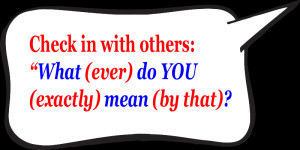 Previously “The most important question to ask yourself” was explored. Now the communication tables are turned and the spotlight is on the other person, your conversation partner.
Previously “The most important question to ask yourself” was explored. Now the communication tables are turned and the spotlight is on the other person, your conversation partner.
The definition of communication is transferring what’s in your head into the head of another person. But we are always moving so fast (why exactly?) that we don’t take the time to make sure that the desired transference happens clearly and completely. We think that a nod indicates “got it”, when that could be far from the other person’s reality. Oh, they may also think they have it right, but when things go awry and disaster strikes that’s when you both realize that the knowledge transfer was faulty; but too late, the damage is done! “What happened? (you wonder incredulously, like this could never be your fault) I thought you understood!!” Oops…Next starts the blame game.
The most important question to ask others is: What do you mean? (Help me to understand what’s in your head, because I don’t know if my thoughts transferred accurately.)
As always, tone is VERY important – make sure the emphasis is right. So,
Not: “WHAT do you mean?” which is accusatory.
Not: “What DO you mean?” which is hostile.
Not: “What do you MEAN?” which is the beginning of anger.
Preferably you want to control the tone and ask in a level voice, but that’s just not possible, then put the emphasis on YOU: “What do YOU mean?” (silently: since I potentially take what you just said to mean something else entirely)
Why do unfortunate and preventable communication mistakes happen daily, and multiple times a day? Because we make half-baked assumptions that “of course they understood properly, after all they’re not stupid!” so we beg off wasting our precious time checking in. We get into so many bad situations by assuming, when we could have just taken a few seconds to clarify.
Or we don’t want to embarrass the other person by asking, “You get what I mean OK, right?” Hmm, now who’s going to risk looking stupid by replying, “No, I don’t understand…” – which you’ve now painted them into the idiot corner with no way out. It’s no wonder that you and your veiled offer of an explanation is summarily waved off, resulting in foggy understanding.
Or we use that superior tone of voice; who would dare ask you for clarification after hearing THAT voice intoning, “Do I need to state the obvious (implying: you child)?” Not even a real question.
The most important question you can ask every conversational partner is a simple checking in to ensure accurate understanding – asked in a nice, non-threatening way – and the higher the stakes, the more important the need for clarity.
Deciding what’s at stake requires some forethought. Not a lot, but some slowing down to consider. It’s helpful to take a second every time and imagine things down the road: how dire would the results be if the understanding here is faulty? If nothing is at stake, no worries. But if there is any annoyance to be suffered should things go south, the extra few seconds spent making sure the thought transference was complete are well worth the effort.
Life is too short to spend any part of it annoyed, when the annoyance could easily be avoided. All it takes is developing a new mental habit of forethought before action. Think about future consequences, and instead of assuming, take a few seconds to clarify with the other person.
Then give yourself a nice pat on the back for having such good communication skills, saving yourself from yet another communication snafu of any size.
